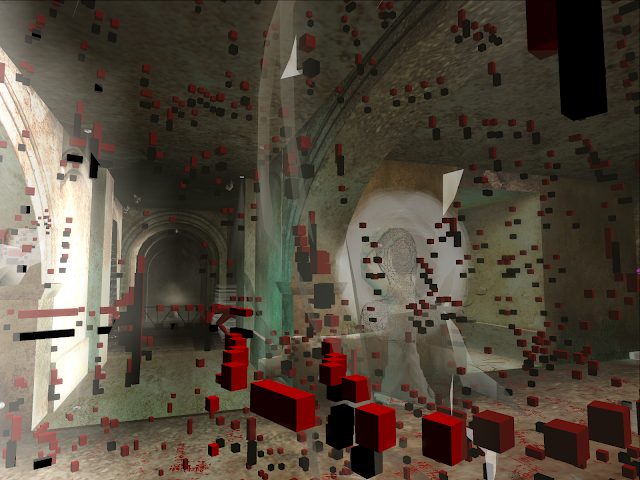Sybil, a virtual installation
Sibilla prese un pugno di sabbia dalla spiaggia e chiese ad Apollo di lasciarla vivere tanti anni quanti i granelli che aveva raccolto nella sua mano. Il Dio l’accontentò ma la fanciulla commise un grave errore: si dimenticò di aggiungere di voler vivere gli anni in eterna gioventù.
La sacerdotessa visse tanti anni quanti erano i granelli di sabbia racchiusi nel palmo della sua mano, ma il suo corpo continuava ad appassire e a raggrinzirsi anno dopo anno, fino a sfumare nella polvere, eroso – proprio come i granelli di sabbia – dallo scorrere impietoso del tempo. Di lei, si narra, sopravisse solo la voce, e le sue sibilline predizioni. Sibilla usava spargere al vento le foglie di palma sulle quali venivano riportate le parole della profezia;
Si narra che un soldato, accolto il sacro responso, si preparò a ricomporre il vaticinio assemblando le foglie di palma sparpagliate dal soffio divino. Tuttavia, quando lesse la predizione della Sibilla, si accorse della sua duplice interpretazione, a seconda della punteggiatura: Ibis, redibis, non morieris in bello – Andrai, tornerai, e non morirai in guerra -, se la virgola anticipa la negazione; Ibis, redibis non, morieris in bello – Andrai, non ritornerai, e morirai in guerra –, se invece viene posizionata dopo la negazione.Le leggende intorno al mito della Sibilla sono diverse.
Giovanna Cerise's exhibition, inspired by the figure of the Sibyl, is set in the cave located in Cuma and rebuilt at Museum Island, in Second life, an online virtual world. According to tradition, the priestess resided in this dark place.
According to the legend, Sibilla was a young girl of superb beauty of Greek origin who possessed great divination skills. One day the God Apollo, struck by her beauty, fell in love with her and to conquer her he promised her that he would fulfill her every wish.
Sybil took a handful of sand from the beach and asked Apollo to let it live as many years as the grains he had collected in his hand. The God satisfied her but the girl made a serious mistake: she forgot to add that she wanted to live the years in eternal youth.
The priestess lived as many years as there were grains of sand enclosed in the palm of her hand, but her body continued to wither and wrinkle year after year, until it faded into dust, eroded - just like the grains of sand - by the merciless flow of the time. Of her, it is said, only her voice and her cryptic predictions survived. Sibyl used to scatter palm leaves on which the words of the prophecy were reported;
It is said that a soldier, having received the sacred response, prepared to recompose the prophecy by assembling the palm leaves scattered by the divine breath. However, when he read the Sybil's prediction, he noticed its double interpretation, depending on the punctuation: Ibis, redibis, non morieris in bello - You will go, you will come back, and you will not die in the war - if the comma anticipates the negation; Ibis, redibis non, morieris in bello - You will go, you will not return, and you will die in the war - if instead it is placed after the negation.
The legends around the myth of the Sibyl are different.
http://maps.secondlife.com/secondlife/Museum%20Island/228/25/22


































































